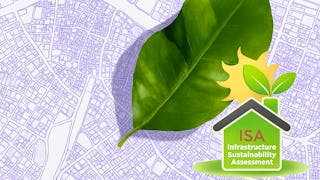The transformation of land use, functions, and services in cities represents an opportunity to foster sustainable development, contributing to local and global challenges. Urban regeneration is a key area to govern change, attract investments, engage stakeholders, and generate multiple benefits in both developed and developing countries.


(21 reviews)
What you'll learn
Understand the role of cities in global dynamics and the main drivers of sustainable urban development.
Identify and assess the main elements of sustainable urban regeneration projects, considering their impact on the environment and society.
Evaluate key phases, actors, and mechanisms that operate in urban regeneration projects to create value.
Appraise the main funding and financial instruments to support urban regeneration projects.
Skills you'll gain
Details to know

Add to your LinkedIn profile
6 assignments
See how employees at top companies are mastering in-demand skills

There are 6 modules in this course
The week aims to frame the main challenges and opportunities linked to urban development. In this context, the concept of sustainable urban regeneration and its impacts will be described also through the use of worldwide urban regeneration case studies. Guest speakers: Javier Torner, UN-Habitat; Lamia Kamal-Chaoui, OECD; David Miller, C40; Ricky Burdett, LSE Cities
What's included
11 videos4 readings1 assignment1 discussion prompt
The week is focused on one of the main challenges cities are facing nowadays climate change. After the description of the main impacts of climate change at the urban scale, policies and measures to improve urban resilience will be presented with a particular focus on the role of regeneration processes. Guest speakers: Federica Ranghieri, The World Bank; Eero Ailio, European Commission; Wolfgang Teubner, ICLEI
What's included
8 videos4 readings1 assignment
Urban regeneration can improve quality of life in cities generating impacts on economic, environmental, and social domains. The week is dedicated to the analysis of the impacts of urban regeneration processes and their capacity to create private and social value. Guest speakers: Andy Bow, Foster and Partners; Mario Abbadessa, Hines Italy; Nicolas Buchoud, Grand Paris Alliance for Metropolitan Development
What's included
7 videos3 readings1 assignment1 discussion prompt
Several standards and protocols have been developed to assess impacts of policies and measures implemented in cities. The week aims to highlight the main potential of those standards focusing on their scale of application, factors, criteria, scores, etc. A specific focus is dedicated on how ESG investment criteria are applied in urban regeneration projects. Guest speakers: Alejandro Gutierrez, Arup; Giuliano Dall’O’, Politecnico of Milan and GBC Italy; Erica Abisso, Intesa Sanpaolo.
What's included
7 videos4 readings1 assignment
Cities can adopt different governance models to support urban regeneration processes, capture the value created, and to engage stakeholders. At this purpose, the policies, instruments and business models for urban regeneration will be presented and analyzed during the week. Guest speakers: Rogier van den Berg, WRI Ross Center; Riccardo Serrini, Prelios; Daniela Rizzi, ICLEI Europe
What's included
7 videos3 readings1 assignment1 discussion prompt
This week is dedicated to the final assessment of the course.
What's included
1 assignment
Instructors



Offered by
Explore more from Economics
 Status: Free Trial
Status: Free TrialLund University
 Status: Free Trial
Status: Free TrialLund University
 Status: Preview
Status: PreviewÉcole Polytechnique Fédérale de Lausanne
 Status: Preview
Status: PreviewUniversitat Politècnica de València
Why people choose Coursera for their career




Learner reviews
21 reviews
- 5 stars
90.47%
- 4 stars
9.52%
- 3 stars
0%
- 2 stars
0%
- 1 star
0%
Showing 3 of 21
Reviewed on Jun 18, 2024
A great course on the insight into sustainable cities!

Open new doors with Coursera Plus
Unlimited access to 10,000+ world-class courses, hands-on projects, and job-ready certificate programs - all included in your subscription
Advance your career with an online degree
Earn a degree from world-class universities - 100% online
Join over 3,400 global companies that choose Coursera for Business
Upskill your employees to excel in the digital economy
Frequently asked questions
To access the course materials, assignments and to earn a Certificate, you will need to purchase the Certificate experience when you enroll in a course. You can try a Free Trial instead, or apply for Financial Aid. The course may offer 'Full Course, No Certificate' instead. This option lets you see all course materials, submit required assessments, and get a final grade. This also means that you will not be able to purchase a Certificate experience.
When you purchase a Certificate you get access to all course materials, including graded assignments. Upon completing the course, your electronic Certificate will be added to your Accomplishments page - from there, you can print your Certificate or add it to your LinkedIn profile.
Yes. In select learning programs, you can apply for financial aid or a scholarship if you can’t afford the enrollment fee. If fin aid or scholarship is available for your learning program selection, you’ll find a link to apply on the description page.
More questions
Financial aid available,


